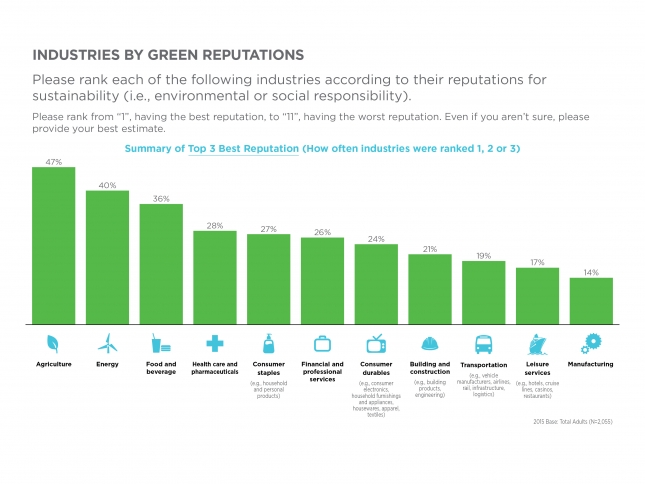A recent sustainability study by G&S Business Communications found that the construction industry is one of the lowest-ranked industries for a "green reputation." CBO sat down with the author of the study, Ron Loch, to discuss why Americans ranked the construction industry so low and what the industry can do to better its reputation. Loch is the managing director of sustainability consulting at G&S Business Communications. Check out a helpful infographic featuring study results, as well as Loch's answers, below.
The 2015 G&S Business Communications Sense & Sustainability Study, fielded by Harris Poll, is the firm’s sixth annual survey of U.S. adults about their perceptions of the corporate commitment to environmental and social responsibility.

CBO: Why did only 21 percent rank the construction sector as a “Top 3” sustainable industry?
RL: I think it’s largely because of personal experience and the imagery associated with the construction industry. People conjure up the image of mounds of earth and giant construction waste bins. We are looking at consumers age 18 and above in this study. We didn’t specify what kind of construction, so it may largely be attributed to imagery. That may also explain why you see agriculture so high on the list—imagery for agriculture is green and bucolic.
CBO: What are the biggest issues you see with sustainability in the construction sector?
RL: To a certain degree, the imagery I just mentioned is an issue—it’s the nature of the beast, though. Earth has to be moved in construction, and to do it, you need giant equipment and dumpsters. It doesn’t appear sustainable. That could be combatted with better signage and helping educate the public about the attributes of a project that may be sustainable. Whether you are building a LEED-certified building or not, the first interaction people have with the project will be the same.
CBO: What ways do you see for the industry to improve its reputation as a whole?
RL: Embrace the issues that are essential. Be honest about how you are addressing those issues and educate the people coming in contact with your project. Whether it is land preservation, energy use or another environmental issue, help people understand how the construction industry is addressing the issue. If you look at the UN Sustainable Development Goals and commercial construction, particularly building up, not out, touches on one of the biggest challenges—addressing the increasing global urbanpopulation, being able to feed said population and minimizing the energy and water footprints cities will have in the future. If the industry becomes a part of that conversation, it will be beneficial to everyone. The construction sector can focus attention on the good that is being done versus what people intuitively think when they see a barren lot.
CBO: What are the top immediate changes individual business owners can make to improve their green reputations?
RL: Every business owner needs to define what sustainability means for his or her business. Know where your business touches the environment and how you can identify those issues as being important to you and your brand. Once you do that, you can start telling your stories about your goals and your progress against said goals. Then you own that reputation for sustainability. Rather than try to mimic what others are doing and having it backfire, your plan has to start with identifying and managing your aims within your own company. Be authentic—that’s much better than doing nothing.
To read the full study, click here. Visit G&S Business Communications for more information. Make sure to check the Construction Business Owner website next week for more key statistics from the study.
